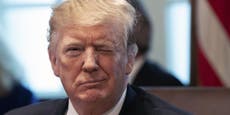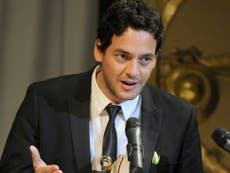Trump’s critics wanted Mueller to find Russian collusion – but his report leaves them soul-searching
To credit Russia with swinging the result is to exaggerate Russian power in the same way that Soviet military capability was overestimated

Robert Mueller, the special counsel appointed to investigate collusion between Donald Trump’s election campaign and Russia, was presented by US Democrats and much of the US media as a paragon of the honourable and careful lawyer. If anyone could get to the bottom of the supposedly murky relationship between Trump and Russia, he was your man.
Well, he was. And he did.
After investigating for the best part of two years – during which he “issued more than 2,800 subpoenas, executed nearly 500 search warrants… made 13 requests to foreign governments for evidence, and interviewed approximately 500 witnesses” – he found there was little there.
In his summary for Congress, US attorney general William Barr, said: “The investigation did not establish that members of the Trump campaign conspired or coordinated with the Russian government in its election interference activities”. As the president himself had insisted, and could now boast in triumph, “there was no collusion”.
Now I admit to writing this with a degree of vindication as one of few media sceptics on the matter. And what we are now seeing, in the US at least, is some soul-searching about how the presumption of guilt replaced the presumption of innocence when it came to Trump and Russia. But that is not the whole story. After the initial shock, we are also seeing a good deal of wriggling from Trump’s enemies along the lines of: well, we’ve only seen the summary; as a presidential appointee, the attorney general has most likely “spun” the report in his patron’s favour; it’s wrong to say he was exonerated, and Russia – well, Russia, with or without Trump, was guilty as hell.
These counter-charges need to be addressed before they become as unquestioned as the collusion allegation. Absolutely, the report as a whole should be published, but I doubt it will all ever see the light of day, given that some evidence was solicited from foreign governments. There will be crucial redactions “on security grounds” that will leave inevitable doubts – including about any role played by the UK’s GCHQ which reportedly supplied the tip-off about Russian interference.
As for Barr, he may be in Trump’s camp, but he has included several less comfortable findings, including that Trump was not “exonerated” of trying to obstruct the course of justice and that Russia did interfere, just not in cahoots with the Trump campaign.
How serious these points are can be disputed. If not on collusion, but on the separate claim of obstructing justice that Trump was “not exonerated”. And the reason for the ambivalence here is that Trump’s innocence of collusion makes it moot whether there was any justice for him to obstruct. What court would convict someone of perverting the course of justice to get out of a crime they had not committed?
There must be questions, too, about Mueller’s findings on Russian interference – what sort and how much – which may or may not be answered by the full report. Given the strange opaqueness of the last US presidential campaign, it would have been a derelict intelligence service that did not try to penetrate the main campaigns. And what might have been found if the same diligence had been applied to identifying UK, or French or Israeli attempts to discover what was going? There is also a big difference between trying to find out what is going on beneath the surface of a campaign and trying to influence the outcome.
So far as there is any information in the public domain, it suggests that any influence attempts via the social media were pathetically small and amateurish, with possibly commercial, rather than political, intent. Also, it is all too often forgotten that everyone – and I would include in that “everyone” the Kremlin itself – assumed until election night itself that Hillary Clinton would win. To credit Russia with swinging the result is to exaggerate Russian power in the same way that Soviet military capability was overestimated too.
This stereotypical misperception also feeds into the answer to the much bigger question: how was it that Trump-Russia collusion evolved so quickly from hypothesis to fact. Why were so many in Washington so quick to accept that US had been tricked into electing a traitor as president?
The exaggeration of Russia’s capabilities reach has to be part of it, along with the pervasive legacy from Soviet times, according to which Russia is still essentially the Soviet Union and still enemy number one. Then there was the rank disbelief among Democrats that their fine compatriots could ever have elected Donald Trump. Hillary’s victory had to have been “stolen”.
And last but not least was Trump’s single, clear, campaign pledge – to explore the prospect of improving relations with Russia – which seems to have scared hawks in all corners of the US capital. Join the dots Trump’s adversaries cried – the media did especially, casting normal diplomatic meetings as treason and inserting a non-existent Russia link into standard American crimes, such as tax evasion, money-laundering, and lying under oath, which were the only crimes, in the end, that Mueller actually uncovered.
So with the Trump clan now cleared of collusion – and Trump’s legitimacy as president thereby affirmed – has Trump now received a green light to revisit his campaign pledge and set a date for a full-dress, olive-branch, summit with Vladimir Putin.
Well, yes – and no. Trump is flaky enough and self-willed enough to ignore the inevitable objections from Congress and the intelligence services and do just that. But the objections from the Washington establishment will not be so easily assuaged.
The fallout from what has become known as “Russiagate” runs wider. First there is the extent to which the political atmosphere has been poisoned against Russia. With the skirmishing for the next presidential race already beginning, Trump may also have run out of time, with any rapprochement with Russia having to wait for a second term. Nor would Russia necessarily respond favourably. For many months, Putin remained above the fray, in the apparent hope of a mood change in Washington. Now that Russia has essentially rearranged its foreign policy to cope with a hostile, but declining, United States, he may not be open to a new detente.
Second, Trump has to deal with a Democrat majority in the House of Representatives for the second half of his term. Those elections took place amid a Russia-frenzy that was now found to be false. It may be asked who is illegitimate now but the balance of power has changed.
Third, the whole Russiagate saga carried hopes (for Trump’s opponents) of eventual impeachment and more. Its very dominance, though, served to divert attention from some of the real flaws that cast doubt on Trump’s credentials for the presidency: his business dealings and his attitude to women, to name but two. Now, Trump has only to chant “there was no collusion” for doubt to be cast on the rest.
And lastly, there was the international fallout. Following Washington’s lead in assuming Trump-Russia collusion, other countries also found latter-day “reds”, if not under their beds, then somehow engaged in electoral malpractice. The Brexit referendum and the French presidential elections were prime examples, even though none of the claims has been verified. Still the search, and the vilification, goes on.
There are those now comparing Trump-Russia collusion to Iraq’s weapons of mass destruction in terms of baseless claims that have shattered trust in Western establishment elites. The merciful difference so far is that there has been no war. What there has been, however, is a big opportunity lost to defuse a key source of international tension – a chance that may have gone for ever.




Join our commenting forum
Join thought-provoking conversations, follow other Independent readers and see their replies